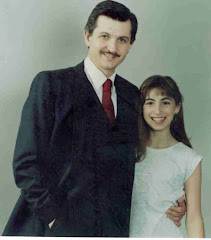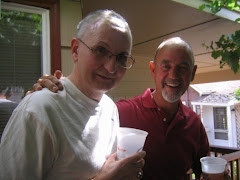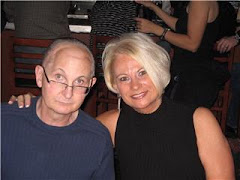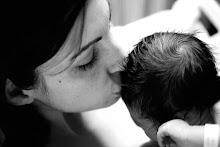di·chot·o·my - Division into two mutually exclusive, opposed, or contradictory groups: a dichotomy between thought and action.
“Count my staples.” That was the first thing I remember him saying to me when I arrived home from camp. His craniotomy was a few weeks prior, but I’d been shipped out until then. I was so scared and nervous to be near him. And here I was, just barely twelve, anxiety-ridden and alone with dad. Our relationship had always been difficult –marred by irrational anger and frustration.
His full head of thick, almost black hair was half gone, replaced by a fresh scar spanning practically the entire width of his (former) hair line, covered in railroad track fashion with large staples. The red gash above his eyebrow was still visible, the remnant of a seizure that brought his strong frame tumbling down to the edge of a pool. I can still remember looking in his eyes and trying to talk to him to see if he was ok and again they fluttered back into his head and he fell backwards, coming out of it moments later with only a slight concern that something was wrong. My sister and I had missed the first big event that marked the discovery of the right frontal lobe brain tumor – a grand mal seizure in our living room. My mom thought he was having a heart attack and pounded on his chest so hard he was sore for quite some time, and the incident was thereafter told comically over and over again, to mask the unrelenting anxiety that pervaded our household.
And so marks the beginning of my journey with my dad’s brain tumor…or at least the point at which he was diagnosed. As far back into my childhood as I can remember, my dad was angry, tense and unable to show us love in the ways we all desperately needed. We were afraid of him, partially because we had developed hyper-sensitive tendencies and partially because we never knew what to expect. I vividly remember being so afraid and anxious when I would hear his car pull into the driveway after work that I would automatically try to run and hide. I had panic and anxiety attacks starting at about age 7 and always felt abnormal, especially being around other "normal" families. Back then we had no idea what a profound affect his tumor was having on his personality, cognitive abilities and emotion, and the mark it would ultimately leave on our lives forever. In all likelihood, the tumor had been present and growing since his childhood, only symptomatically expressing itself through seizures when he was 42.
My dad recovered from his first craniotomy remarkably well and was back to work in a few weeks. He tolerated his doses of radiation, although his gorgeous mane never would return, leaving his large, unsightly scar on display for the world to see. Every once in a while he would struggle to find a word, and would jokingly say that “they must have took that part out.” Life continued to be stressful and family life plodded along unhappily, but we all buried our heads in the sand and pressed on in denial until the tumor (or lack thereof) became an after-thought. Ten years and more passed by and we learned to forget the tumor.
As I became an adult, my relationship with my dad improved by strides, especially when I moved out of the house. I looked less at him as an adversary and more as a kindred spirit. He had lost his own father at the tender age of 11, the only person that he seemed to truly love and respect. I knew that deep down he felt a similar love and respect for me, even though it was hard for him to express. We found companionship in our ideals and I made the investment in fostering our connection. Still, times with him could be very difficult – his frustration at simple stressors would make him very uncomfortable to be around, not to mention the embarrassment of some of the inappropriate things that he would say to our family or even strangers.
At the end of 2004, 16 years after his original diagnosis, the seizures returned suddenly. Emotionally I felt like I had slammed against a brick wall. I had let his disease dwindle to a faint memory, something I never thought I would have to meet face to face again. He endured his second brain surgery, but this time it left him dampened enough that he had some noticeable deficits and would never be able to return to work. Although it turned out the seizures were being caused by a build-up of scar tissue in his brain and not a new tumor, it was just as traumatic to his body as if it had. I adopted a new motto, “MY DAD IS MY HERO.”
As the months passed, things improved, slowly but surely. My dad walked me down the aisle. He held my newborn daughter, his first grandchild. We became closer than ever.
In the summer of 2007, he was back in the ER with uncontrollable seizures, this time forcing his delicate brain into a seizure coma – status epilepticus. The only way out was another surgery. This time he couldn’t escape the tumor. Oligodendroglioma grade 2.5, scoring the exact same ranking as it did 20 years prior. The surgeon successfully removed all of it, but leaving him with almost his entire right frontal lobe missing. It took him weeks to come out of the coma. It took him months to regain enough strength to leave the hospital. It will continue to take him years to recover, although I’ve come to accept that a lesser degree of recovery might have to be accepted.
But fortunately I am an adult now, and not a child. I have control over the information and knowledge I can attain and the role I play in the process. And as an adult I can see this experience from many angles, not just the childish victim of a brain damaged parent. I can appreciate the blessings that can be gleaned and understand the gravity of what may possibly lay in the future.
My dad is a dichotomy –a sensitive, intelligent and appreciative person encased by his brain injury. The beautiful parts that I know are there are often opposed and overcome by the ire, frustration and rough language. Through knowledge and compassion I find the patience and clarity to love and be loved, for which I am truly grateful.
Brain Tumor Be Gone!!
Subscribe to:
Post Comments (Atom)










No comments:
Post a Comment